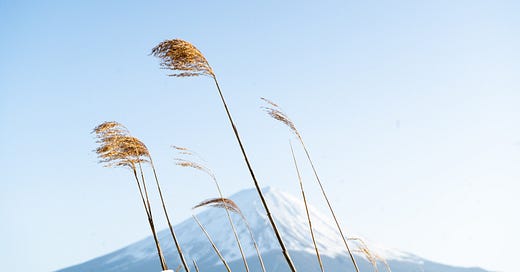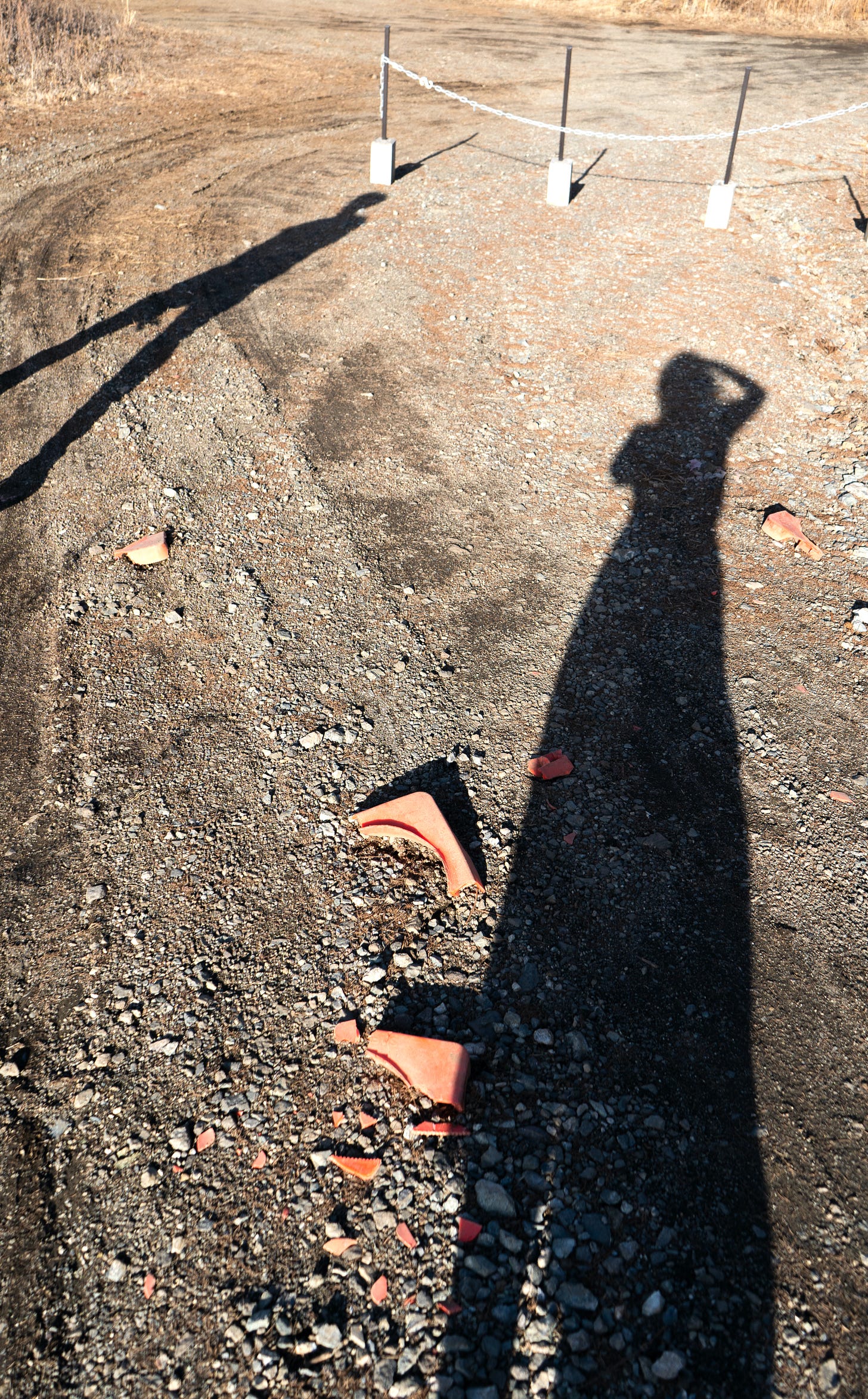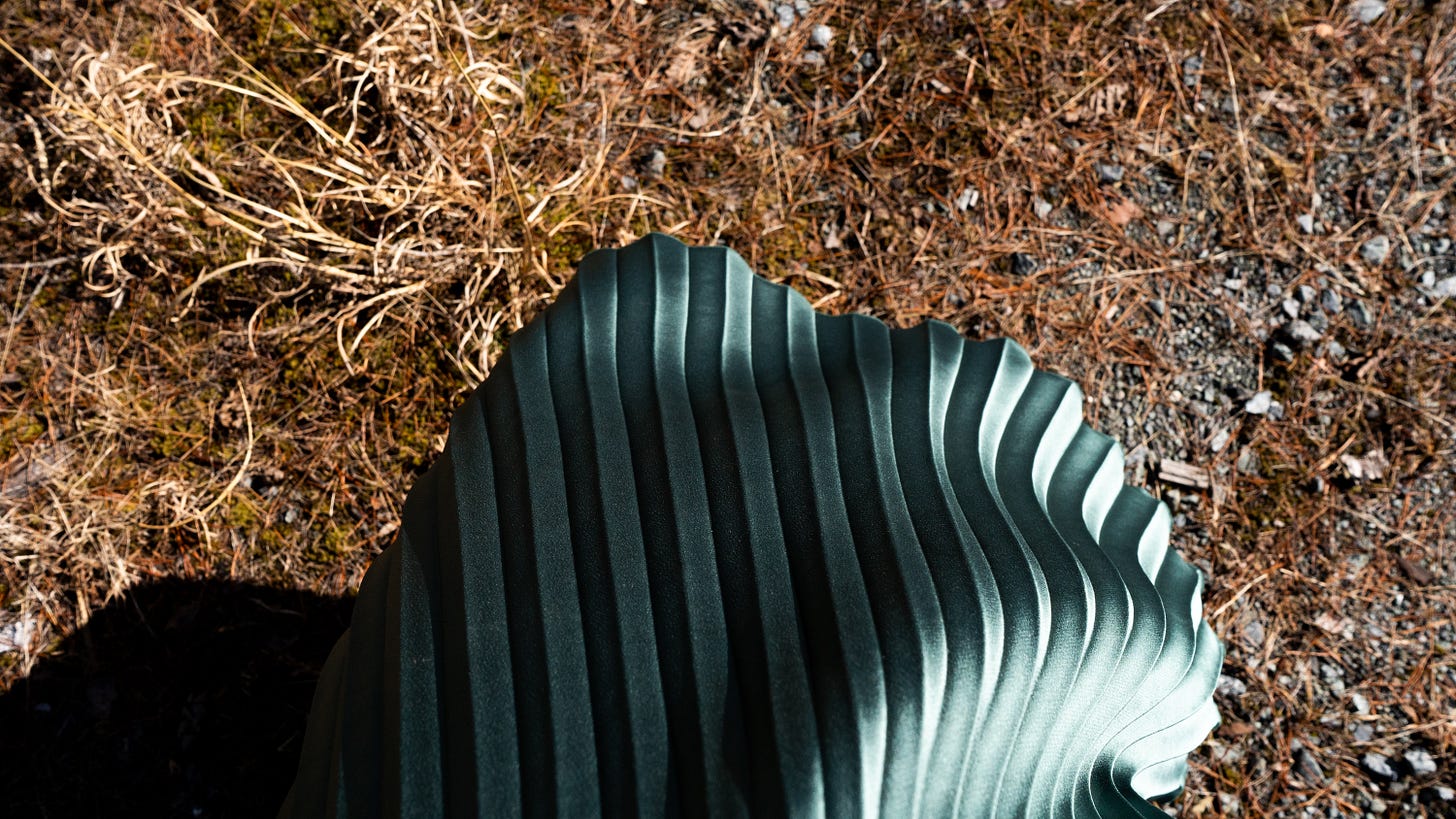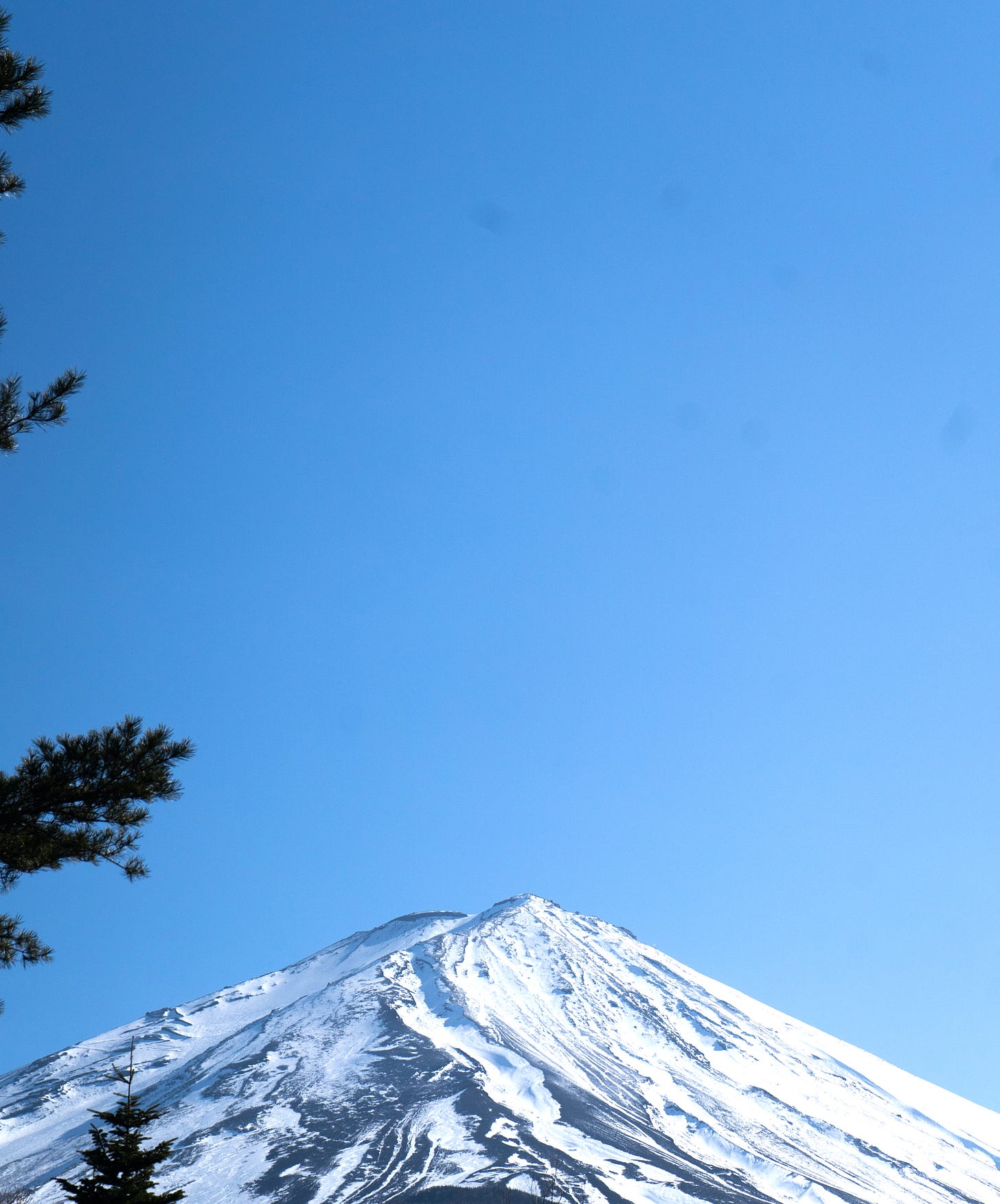In early March, my significant other (let’s call him F) drove the two of us to Mt. Fuji.1 I had only ever seen Fuji in passing and by accident: in transit aboard trains heading somewhere else, from the 41st floor of the Park Hyatt hotel a couple days after New Years, and once from an airplane nearing Narita when the sun was setting above the clouds. Everything below the plane was tinged with orange, even the snow on Fuji’s summit. In the eight years I’ve lived in Japan, I haven’t made the significant trips I’m supposed to make.
As we drove closer towards the looming mountain, I looked out the window. The passenger seat was on the left side, and I’m used to this now—well, it no longer feels strange. The sun was fixed high in the sky, which was a bright blue. The music from the speakers on the car door made my ankles pulse. F often plays songs that I’ve never heard before, inserting lyrics of his own when there’s a long enough pause. Later on, with the windows rolled down, I stretched my arm outside. It was warm. The smell of pine—wet from the melting snow—rushed inside the car. It smells like home. I said loudly, over the music. (I’m not sure if he heard me or not). I haven’t been home in over three years.
We turned left down a slightly bumpy and narrow road. F has been to see Mt.Fuji many times; six years worth of his memories lay dormant there. But he didn’t know this road, he said. I had asked him to take us somewhere he hadn’t been. I didn’t want to disturb the stillness of things—to resurrect the past that sometimes muddled our conversations, and made us both get rather quiet. Part of me knew it would be impossible not to disturb them, as I often feel the presence of my own ghosts, following us quietly in a solemn, floating procession.
We went to place after place. Some he had been to, some he had not. This is a new place. He would say, smiling and proud when we made an unexpected discovery. I felt reassured by his endearing enthusiasm. And privately embarrassed by my fear that something would rupture or spill out. There were no ghosts here. Maybe ours from today would linger for a while.
When we left our first ‘new place,’ (a newly built cafe) I reached for his hand and asked him to slow down. We were walking down a gravelly hill, and he was already rushing to our next location. He often moves quickly, rarely stopping anywhere for long. He turned suddenly and kissed me on the lips, a soft peck. In my surprise I told him it was a ‘bird kiss.’ Have you ever kissed a bird before? He asked, letting go of my hand, then gliding to the car without pause. When we landed at our next destination (an old cafe he’d been to many times), F stayed in the car because it was closed. He began searching for the next place, the next place, the next place. I climbed out of the car to listen to the birds. They sang louder here next to the mountain. Unfeigned, they sang a different song.
We were deep inside a forest when he had to make a phone call. I wandered down a snow covered road by myself and came upon a clearing. There was a man in a red jacket. I said konnichiwa when he walked by, but he ignored me. A little while later, a couple carrying a panting corgi smiled and stopped to say hello. They told me their dog gets tired easily, then pointed to the center of the clearing where the man in the red jacket was now standing; now made small in the distance. He was setting up a tripod. Soko kara Fuji-san wo yoku mieru yo. You can see Mt. Fuji really well from there.2 The couple said, acknowledging the camera around my neck with a gentle nod. In my right palm I held a small pine cone that I had just picked up off the ground.
I was about to go further into the clearing when I heard F saying my name from far away. He called out again and I answered with his name. I had left my phone in the car. We had to wander towards the sound of each other’s voices to find one another. Our names took their turns echoing throughout the trees, but all else was immensely silent.
His phone call hadn’t gone well. I could see it in the maps across his face when he came near. I left the clearing behind, telling the couple we’d come back to see it again another day. As I said the words, however, I realized they weren’t true. I searched F’s face for why, but he said nothing. The sentiment fell falsely from my lips, hung limply in the damp air. Another ghost made, perhaps. The couple smiled and waved goodbye. They too seemed to notice something floating with us, a truth that couldn’t quite be named. F and I walked back to the car separately and in silence. He couldn’t look at me then. Once the car doors closed, another phone call would confirm the suspicion that he may have very little time left in Japan.
The night before going to Fuji san3, we ate appetizers that turned into dinner. Bread dipped in guacamole, bread dipped in salsa, bread dipped into tzatziki sauce. We watched a show that seemed endless, F kept pressing play next episode with the remote and without delay. Our stomachs were full, but we kept eating. We only stopped because F accidentally poured too much salt into the bowls we were dipping into. After one taste, we had to throw everything away.
I leaned in to rest my head on F’s shoulder, licking my lips of the salt with a slight frown. It’s like stealing honey. F said softly, as he often says about physical touch; in this moment referring to my cheek near his collarbone. I looked up at him to see a smile traveling to the corner of his mouth, where it sometimes gets stuck. I told him I thought embraces were like sharing honey, not stealing it. He didn’t respond, as he often doesn’t feel the need to. We press play once again, and read the command out loud in unison like robots. Play, play, play. He uses his arms to bring me closer to him; tightly pressing me in place. Physical touch. I wonder who is stealing honey from who. And how much longer we have left to steal it.
The highest mountain in Japan. An active volcano that last erupted in 1707, standing at 3,776 m (12,388 ft). Mt.Fuji is also fondly known as Fuji-san, or a bit redundantly, Mt.Fujiyama. ( “Yama,” 山, means mountain). A quote from my student on March 16th, 2022: “[Mt.Fuji] cheers me up because it represents the Japanese spirit.”
In Japanese: '「そこから富士山をよく見えるよ。」
Kanji & Hiragana & Romaji readings:
富(ふ fu ) 士(じ ji ) 山(さん san )| 富(ふ fu ) 士(じ ji ) 山(やま yama )
This newsletter just hatched last month on March 25th, 2022. If you find value in Swallow, please support its growth by sharing it with others. A little goes a long way.
ちりも積もれば山となる。Romaji reading: chiri mo tsumoreba yama to naru. “Even dust, when piled up, becomes a mountain.”







Very moving. That first picture of the shadows says it all. Well done!
"...I often feel the presence of my own ghosts, following us quietly in a solemn, floating procession." Beautifully written, Jes. I'm in awe.